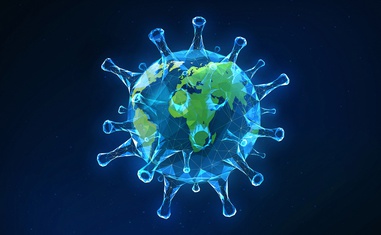The views expressed in our content reflect individual perspectives and do not represent the authoritative views of the Baha'i Faith.
Here’s a scary new pandemic-related term to think about and digest: vaccine nationalism. Any idea what it might mean?
You can probably venture a pretty accurate guess. Vaccine nationalism describes what happens when countries that first develop vaccines to protect against rampant diseases hoard key components of those life-saving vaccines and get priority access to them.
Or, as one recent RAND Corporation research study on the subject put it:
Experience shows that, in response to pandemics, national governments tend to follow their own interests instead of pursuing a more globally coordinated approach. This nationalistic behaviour could have negative consequences on how well the COVID-19 global pandemic is managed and contained.
How does that work?
Well, if some countries—the wealthiest of the world’s nations—manage to immunize most of their own populations, and the poorer countries can’t afford to do the same, our planet will still continue to have a serious, debilitating crisis on its hands. Why? Because, as the Baha’i teachings have long proclaimed, we now live in an interdependent world:
… all the members of the human family, whether peoples or governments, cities or villages, have become increasingly interdependent. For none is self-sufficiency any longer possible, inasmuch as political ties unite all peoples and nations, and the bonds of trade and industry, of agriculture and education, are being strengthened every day. Hence the unity of all mankind can in this day be achieved.
Abdu’l-Baha, the son and successor of Baha’u’llah, who founded the Baha’i Faith, wrote those words more than a century ago. Since then, our interdependence has only grown.
National borders have become less and less relevant. The world has now developed so much international trade in food, goods and services that no country can claim self-sufficiency. Most of us, especially those who live in urban areas, rely on this global ecosystem and its constant flow of material for our everyday survival. Most of us don’t produce food, or manage the distribution of water, or generate energy, or make our cars, computers or cellphones, so we rely on other people in other places to keep us whole. Most of us get our daily sustenance from this planet-spanning network we’re only dimly aware of—but if it stopped tomorrow, we could not sustain our current lives for even a single day.
That’s why we must address this global pandemic globally.
Let’s say, for instance, that the United States had the ability to effectively vaccinate its entire population against the coronavirus tomorrow. Would that return the country to full employment and economic health? No, economists from across the political spectrum agree. In fact, that kind of short-sighted nationalistic disease prevention program would be roughly analogous to embarking on a campaign to vaccinate everyone in Nebraska, believing that it could ultimately protect the state’s citizens. Borders and oceans do not protect us, especially from a virus.
The United States, like all nations today, relies on international interchange, trade, and travel for much of its economic health. As many so-called “developed” nations have, the U.S. has outsourced so much of its basic manufacturing to the “developing” world, which means that it no longer has the industrial capacity it needs to sustain its own populace.
So looking at these realities from the standpoint of a global pandemic, we now face an unprecedented and potentially profound inflection point: we clearly cannot solve a planet-wide problem with a nation-based solution. The solution, by definition, has to address the entire problem and not just a small portion of it.
Baha’is believe that this new dynamic, as expressed in an April 1992 letter to the Baha’is of the world from its democratically-elected leadership body The Universal House of Justice, will ultimately require humanity’s unification under a new world order:
The call for unity, for a new world order, is audible from many directions. The change in world society is characterized by a phenomenal speed. A feature of this change is a suddenness, or precipitateness, which appears to be the consequence of some mysterious, rampant force. The positive aspects of this change reveal an unaccustomed openness to global concepts, movement towards international and regional collaboration, an inclination of warring parties to opt for peaceful solutions, a search for spiritual values.
This concept of an international collaboration which leads to a globally-coordinated and applied solution to the pandemic isn’t just a kind, altruistic, humanitarian one, either.
The RAND Corporation’s recent study on vaccine nationalism concluded that it would cost approximately $25 billion to supply the world’s lower-income developing countries with effective vaccines. Alternatively, the United States, the United Kingdom, the European Union and other high-income countries combined could lose about $119 billion each year if the poorest countries don’t have access to those vaccines—because the unchecked spread of the disease would cause the flow of goods and services from those countries to diminish dramatically.
If you do the math, you’ll see that the world’s wealthiest countries financing vaccinations for the populations of all the world’s developing countries produces a cost-benefit ratio of 4.8 to 1—without even mentioning the lives it would save. In other words, for every $1 they spend, the world’s developed countries would get back almost $5. Hard to imagine a more cost-effective investment, right?
Amazingly, this kind of globalized systems-oriented thinking seems to have eluded some world leaders. Hopefully, in 2021 we can rectify that myopic viewpoint and demonstrate the oneness of the world of humanity by eradicating COVID-19.

















Comments
Sign in or create an account
Continue with Facebookor